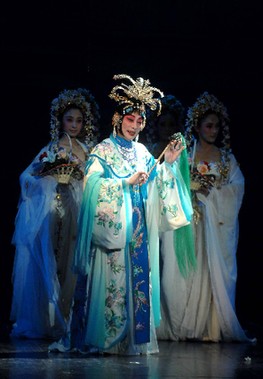China appoints intangible masterpiece inheritors
Updated: 2008-02-20 09:47
BEIJING -- China's Ministry of Culture on Tuesday announced a list of 551 artists with the official responsibility of carrying forward the country's intangible cultural heritage, including Peking Opera and Mongolian Pastoral Song.
 |
|
Mei Baojiu (C) performs at the National Grand Theatre Jan 2. [Xinhua] |
Peking Opera is taken as one of China's most important traditional theater genres and has been proclaimed an intangible cultural heritage enjoying state-level protection.
Comedian Zhao Benshan, 51, a household name in the country, was conferred as a chief inheritor of "Er Ren Zhuan", a traditional song-and-dance duet popular in northeast China.
Zhao is always an attraction at the annual Spring Festival Evening Gala on China Central Television (CCTV) on the Chinese New Year's eve.
According to the ministry, enlisted artists had to undergo a series of procedures, including recommendation by local cultural departments, assessment by an expert judging panel, public review and re-examination.
This was the second batch of artists conferred such a title. In June, the ministry designated 226 artists to help in the preservation of the country's intangible cultural heritage.
Vice Cultural Minister Zhou Heping said local governments should provide convenience for inheritors to pass on their art forms and more artists would be appointed.
"Inheritors having financial difficulties are entitled to government subsidies," Zhou said, adding the ministry was mulling a detailed measure in supporting inheritors to spread their art.
The State Council, China's Cabinet, has included 518 items in 10 categories, such as folk literature, folk music and dance, traditional opera, ballad singing, cross-talk, acrobatics, folk fine arts, traditional handicraft, traditional medicine and folk customs, as intangible cultural heritage.
Four items from China have been listed by UNESCO as world intangible cultural heritage. They are the 500-year-old Kunqu Opera, known for its graceful movements and poetic lyrics; the 3,000-year-old guqin seven-string zither; the Twelve Mukams, a 12-part suite of ancient Uygur music; and the Pastoral Song sung by a Mongolian ethnic group.
|
|
|
||
|
||
|
|
|
|